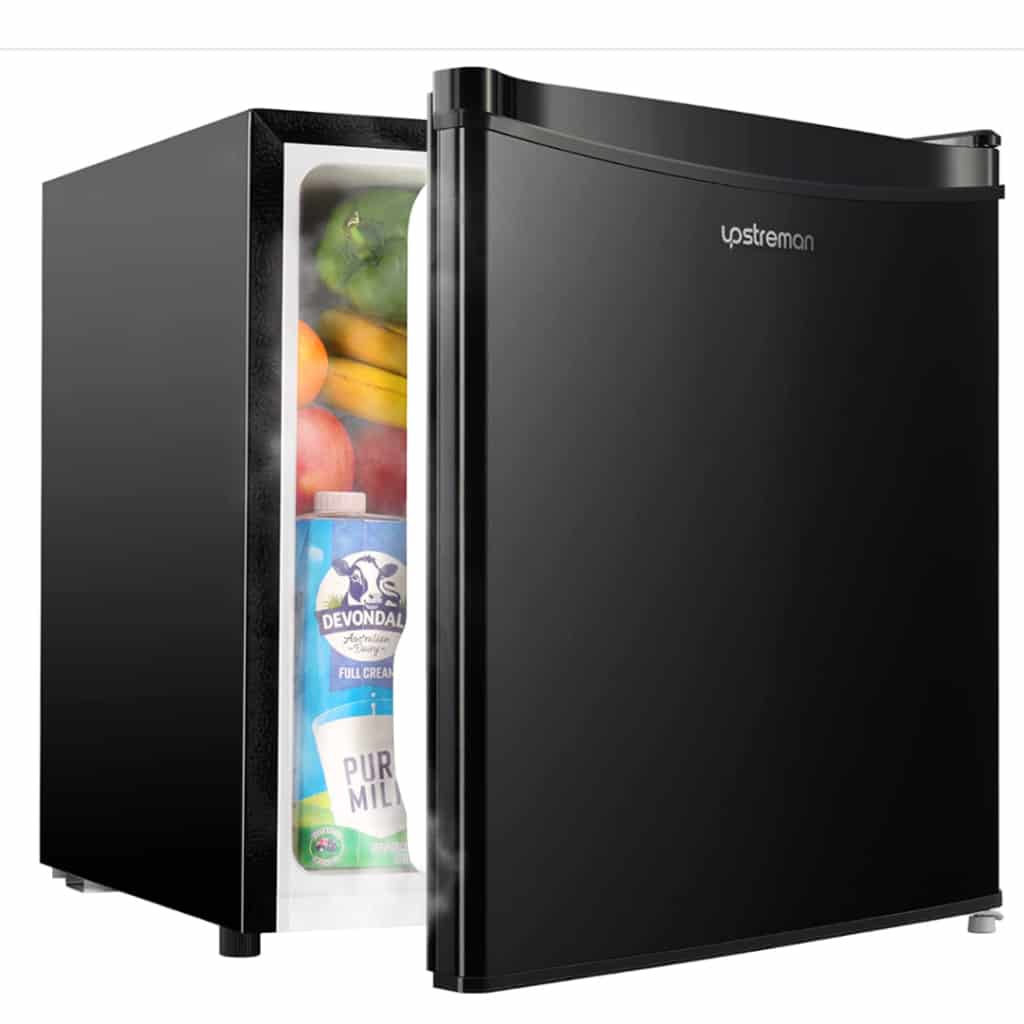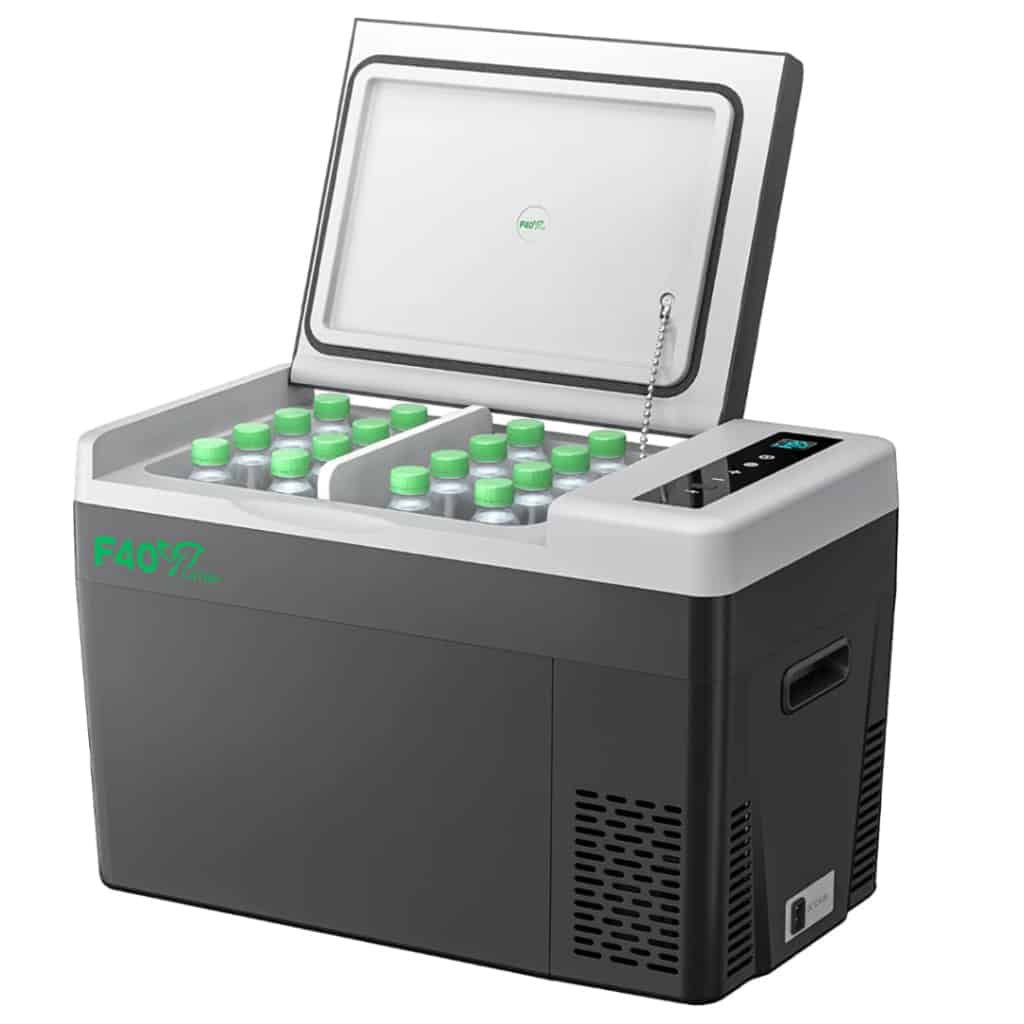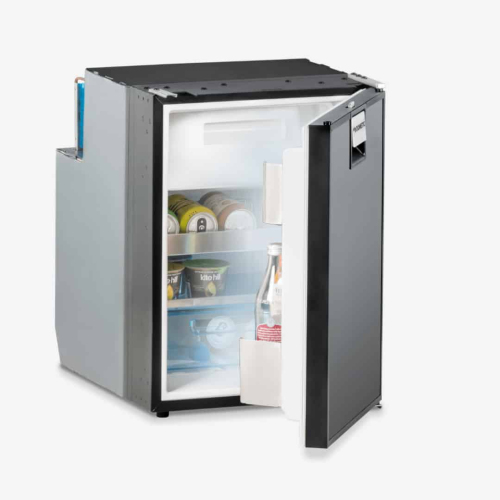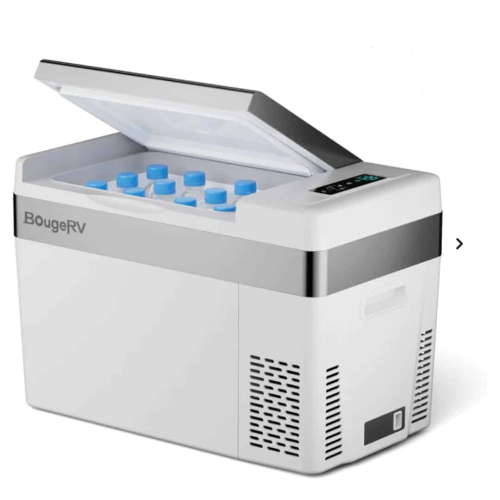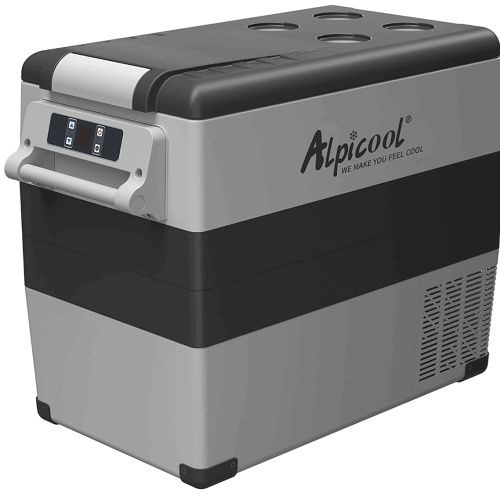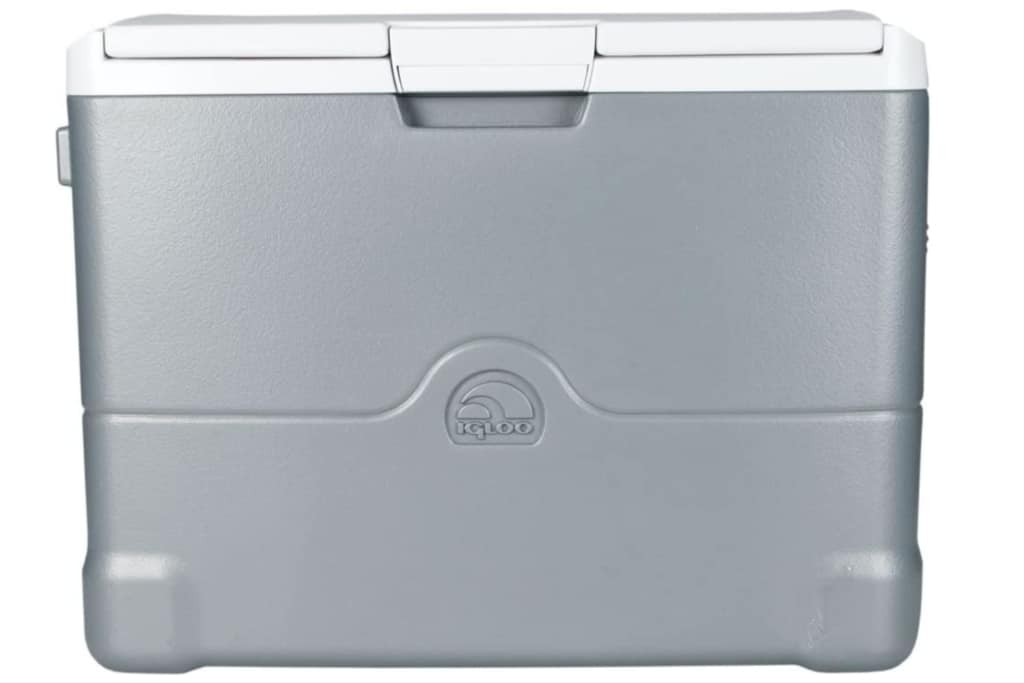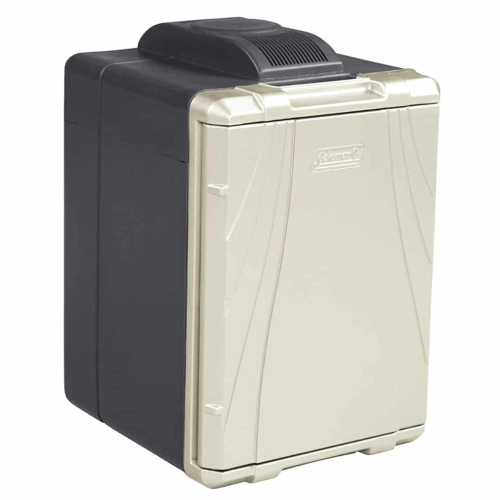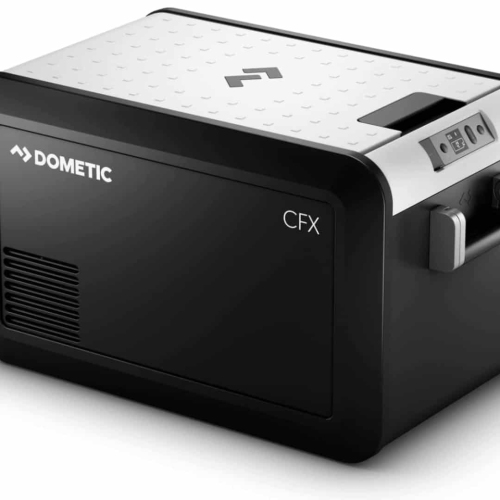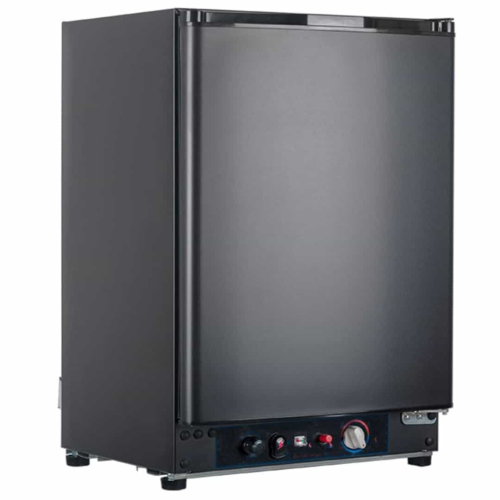I’m all for budget van life, but after a year on the road using different coolers as my “van fridge” – I can assure you that a campervan fridge is worth the investment. The amount of money I spent on ice and wasted waterlogged food–sure, a van fridge may be more expensive up-front, but in the long-run it’s definitely the best choice for any full-time vanlifer!
Now, I use the 12V top-load fridge by BougeRV and it’s pretty energy efficient and quiet. But with so many campervan refrigerator options out there and such minimal storage space in your van–how do you choose the best campervan fridge for your needs?
In this post, we’ll take a look at some of the best 12V campervan fridge options for those on a budget and those looking to spend a little more. We’ll also talk about the different types of 12V fridges and their pros and cons.
Note: this post may contain Amazon Associate or other affiliate links to which I may make a small commission from, at NO extra cost to you.
“Regular” Mini Fridge vs 12V Fridge
First, let’s talk about the difference between a mini fridge and a 12V DC fridge. Can you just put a mini fridge in a campervan? Well, yes, technically you can, but it’s not recommended. A regular mini fridge, such as you would find in a dorm room or garage runs on 120V AC power. That means you’ll need to run it off your inverter, which means it’ll eat up more power consumption.
These days, inverters are pretty efficient, but converting power from 120V AC to 12V DC will always result in some energy loss. That makes running a 120V AC fridge off the inverter less efficient than running a 12V fridge directly from the battery.
BUT (not to contradict myself) there are vanlifers who recommend just using a “regular” mini fridge if you have a really good solar panel power setup. You’ll save a decent chunk of money on the fridge itself (mini fridges typically range from $100-$250). This type of fridge is also a good choice for anyone who has constant access to shore power.
Ultimately, it just comes down to how much energy your power source has to spare on a fridge.
Top-Load vs Front-Load Refrigerators
Back in the early days of portable travel refrigerators, you’d almost exclusively find top-loading fridges. This was largely because they are more evenly-weighted and stable than upright fridges, are technically more “energy efficient” and can be easier to access depending on their location in your overlanding rig or motorhome.
But with today’s advancements in low-power draw appliances, insanely efficient solar power setups, and DIY van builds that allow you to customize your exact fridge storage space, the sky is pretty much the limit! Which is great, because a lot of people like the feel of what they’re used to in a cozy home: an upright fridge with outward-swinging door.
Types of 12V Refrigerators
There are three main types of 12V refrigerators: compressor, thermoelectric, and absorption fridges. As with most things we have to buy for van life, each 12V refrigerator comes with its own perks and drawbacks.
Compressor Fridges
A compressor fridge works like a regular refrigerator in your house. Gas is compressed, causing its heat and pressure to rise. Next, it circulates through coils on the backside of the fridge unit (outside the cool box) and cools until it becomes a liquid. It is then pumped through coils inside the refrigerator and as the liquid turns back into a gas, it draws heat from the air around it.
A compressor refrigerator makes an excellent van life or RV fridge because it draws little power, doesn’t need to be on all the time, and doesn’t need to be kept level.
Pros
- Power efficient
- Typically run on AC or DC power
- Unaffected by ambient temperature
- Can (usually) double as a freezer
- Keeps stuff very cold
- Doesn’t need to be level
Cons
- Difficult to repair if something goes wrong
- Expensive
- Can be heavy or unevenly-weighted
My Top Compressor Fridge Picks
Splurge: Dometic Front-Load CRX Pro 65
This front-loading fridge provides all the comforts of your at-home refrigerator but with the durability to handle bumpy, winding roads. Dometic’s CRX Pro 65 uses its patented compressor especially designed to handle the everyday movements of van life–while also being extra quiet to ensure a restful night’s sleep.
It has a removable freezer compartment and LED light with infrared sensor, and you can control the temperature and compressor speed. Made of “black” stainless steel for a chic (but rugged) product–and also includes a 3-year warranty.
Budget Top-Load: BougeRV 12V Portable Fridge
For those looking for something cheaper, the BougeRV 12/24V DC OR 110~240V AC refrigerator is a highly efficient (able to come down to 32 degrees in under 16 minutes) and highly portable fridge. It is a chest-style fridge and is small enough to fit pretty much anywhere (and can even be carried on road trips away from the van).
Budget Front-Load: Alpicool 12V Freezer/Fridge
This upright fridge can be used as a fridge freezer or refrigerator–it also comes with a fridge basket. A basket may not sound like a big deal, but holy convenient Batman! The cooler basket in my Yeti cooler was invaluable because it prevented me from having to dig around my cooler every time I opened it. This, in turn, kept more cold air from escaping and was super efficient. There are lots of different sized and styled Alpicool 12 volt fridges to check out.
Thermoelectric Fridges
A thermoelectric fridge uses electricity to create a heat differential between two separate materials. Through a process called the Peltier Effect, a DC electric current flows through the device, bringing heat from one side to the other. Through this process, one side gets cooler while the other gets hotter.
Also referred to as “thermoelectric coolers”, these fridges don’t have the same capabilities as a regular fridge because they don’t have any moving parts (ie a compressor). While this makes for a super quiet and inexpensive fridge, its biggest limiting factor is that it can only keep food cold by about 20 degrees below ambient temperature. This isn’t a problem if you’re already in a cold climate, but there’s a higher chance you’ll be in a warm climate where it will be harder to keep food cool.
Some brands claim to have thermoelectric fridges that can cool by up to 40 degrees below ambient temp (ie Coleman’s portable electric cooler) but it doesn’t change the fact that re-cooling the fridge space after opening it will be a slow and inefficient process.
Pros
- Cheap
- Very quiet
- Doesn’t need to be kept level
- No moving parts to potentially break
Cons
- Only keeps food as cold as ~20 degrees below ambient temp
- Not power-efficient
- Not a great option for long-term living
My Top Thermoelectric Fridge Picks
Splurge: Igloo Thermoelectric Iceless Cooler
The Igloo thermoelectric 12V coolers come in sizes ranging from 28 to 40 quarts. My favorite part about these fridges is their two-way functionality: they can be used as a top-loading or front-loading unit (just put in the adjustable middle shelf and turn the box on its side.) The 28-quart model is small enough to carry on excursions, while the 40-quart unit will provide ample space for your long-term perishables.
Budget: Coleman Portable Electric Cooler
The Coleman portable cooler is a 40-quart, front-loading model with space for up to 44 standard cans. It opens from either side, making it convenient in tight or hard-to-reach spaces. It comes with an 8ft power cord that allows you to hook it up to your van even from outside and keeps your food up to 40 degrees cooler than the ambient temperature.
Absorption Fridges
Absorption fridges work on the principle that a liquid like water will absorb a gas like ammonia, creating a highly concentrated solution. When the solution is heated, the ammonia gas evaporates at high pressure and can then be turned into a liquid by cooling. It is essentially the same process as a compressor fridge, without the need for a compressor.
Absorption refrigerators are typically run on propane, and because of this, they must be kept level in order to function. This makes them a less-than-ideal solution for a campervan fridge. They can be run on 12-volt power but they’ll suck up power quickly–making them a lot less efficient than a compressor fridge.
That being said, a big plus to running on a gas flow exchange system (vs a 12v power system) is that these fridges can run for long stretches of time.
Pros
- A good option if propane is your main energy source
- Stays cold
- Can run without maintenance for long periods of time
Cons
- Must be kept level to operate
- Extra costs of refueling on propane
My Top Absorption Fridge Picks
Splurge: Dometic CFX3
This model comes in sizes from 25 to 100 liters. Although it is a top-loading unit, food is made easily accessible through the use of wire baskets and racks. It has a weatherproof, high-resolution UI and can be powered by either AC or DC. There’s also a handy app that lets you adjust and control the temperature and monitor performance.
Budget: SMAD 3-Way 12V Refrigerator
The SMAD fridge comes at a much lower price point than the Dometic model and has the added bonus of being a front-loading unit. It comes in four sizes, from 1 cubic foot to 3.5 cubic feet, and can run off 110V or 12V. It is lightweight and comes with adjustable and removable shelves to maximize storage efficiency.
Which Campervan Fridge is For You?
So which 12V vanlife fridge should you choose for your campervan when first starting out with van life? Personally, I like the BougeRV’s portable compressor fridge because it’s a great bang for your buck. As a compressor fridge it keeps food as cold as possible and this fridge happens to fit perfectly beneath my van conversion benches. It also comes with power cords for both a DC outlet and auxiliary outlet, so I can run it in a house or in my van.
Another one of my top choices is the SMAD 3-Way fridge, as it provides decent cooling and an easily accessible, front-loading interior at a relatively low price point. For those with a little more money to spend, I’d recommend the Dometic compressor fridge.
Ultimately, the fridge you choose will need to fit your budget and lifestyle. If you spend a lot of time hooked up to shore power, an absorption fridge, or even a regular 120V mini fridge might be what you want. For those of us who spend more time on the road and need a fully off-grid solution, 12V compressor fridges and thermoelectric models are probably where it’s at.
Take the time to do your own research and assess your personal needs before committing to any particular campervan fridge.

